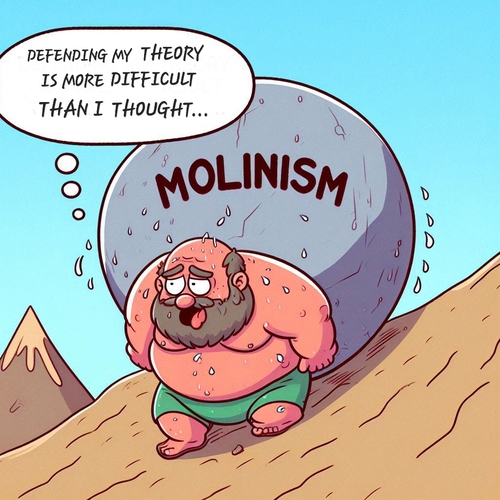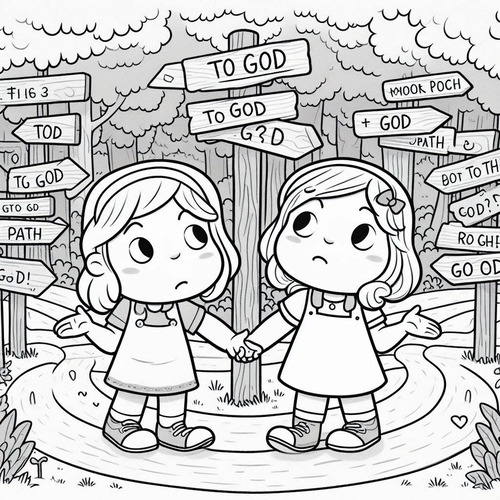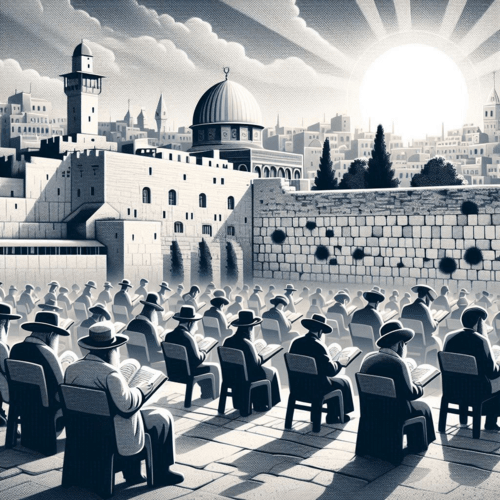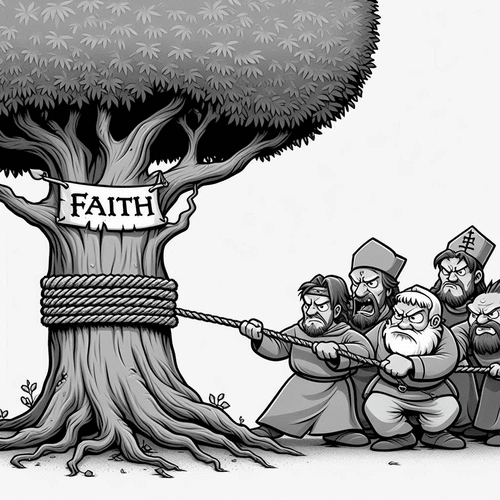Is Molinism Biblical? Reformed Challenges to Middle Knowledge
In a world craving autonomy, does God truly reign supreme, or does He negotiate with human choices? The question lies at the heart of one of theology’s most debated issues: the relationship between divine sovereignty and human responsibility.
Enter Molinism—the 16th-century proposal by Jesuit theologian Luis de Molina. According to this view, God possesses “middle knowledge” of counterfactuals: what free creatures would do in any possible scenario. Armed with this knowledge, God sovereignly actualises a world that reconciles divine foreknowledge with libertarian free will. It sounds elegant, even compelling.
But does the Bible teach this? No—the Scriptures proclaim an unconditionally sovereign God, as the Reformed tradition upholds, without need for philosophical middle knowledge. Here are the strongest Reformed challenges to Molinism from Scripture…
ABSENT: A BIBLICAL FOUNDATION
The most fundamental problem with Molinism is this: Scripture never teaches it. As theologian James White argued in his 2021 debate with William Lane Craig, middle knowledge does not “roll right off the pages of Scripture.” The Bible never speaks of God’s knowledge as conditional upon creaturely choices made independent of His decree. This matters because the burden of proof rests on Molinists to demonstrate this novel category of divine knowledge from God’s Word.
Molinists typically appeal to texts like 1 Samuel 23:6-14, where God tells David Saul would pursue him and that the men of Keilah would betray him. But this passage demonstrates God’s comprehensive decree, not knowledge independent of His will. God didn’t merely observe what Saul would do—He ordained what Saul would do if David remained. As Isaiah 46:10-11 declares, “My counsel shall stand, and I will do all My pleasure.” God’s knowledge flows from His sovereign decree, not from inspecting creaturely choices and actions.
Similarly, when Jesus says in Matthew 11:21-23 that Tyre and Sidon would have repented if they had witnessed His miracles, He’s not revealing knowledge independent of His decree. Rather, He’s demonstrating His comprehensive knowledge of His own sovereign plan.
This leads to what White called the “grounding objection”—the question of where counterfactuals originate if not from God’s decree. As philosopher Hugh McCann noted, “there does not appear to be any way God could come by such knowledge” unless these truths are grounded in God’s decree. If counterfactuals exist independently of God’s will, they become eternal truths outside God—undermining His role as Creator of all reality.
MOLINISM COMPROMISES GOD’S SOVEREIGNTY
The second major problem is that middle knowledge fundamentally compromises God’s sovereignty by making Him dependent on creatures. Scripture teaches that “creatures are dependent on God, not that God’s plans are dependent on creatures” (Romans 9:16). Middle knowledge reverses this relationship. God must “consult” what creatures would freely choose before He can decree anything. This makes creaturely choices logically prior to God’s will—a devastating inversion of the Creator-creature distinction.
Consider Ephesians 1:11, which declares God “works all things according to the counsel of His will.” Not according to counterfactuals He discovers. Not in cooperation with libertarian free choices. According to His will. This is comprehensive, absolute sovereignty.
As Reformed theologians have argued, “the Molinists’ conception of free will makes it impossible for God to exercise providential control over his creation. Why? Because men and women would be free to resist His decree.” But Daniel 4:35 leaves no room for such resistance: God “does according to his will in the host of heaven and among the inhabitants of the earth; and none can stay his hand.”
Even on the problem of evil, Molinism offers no advantage. Craig argued in the debate: “If it is evil to cause someone to do evil, then Calvinism makes God evil.” But Molinism doesn’t solve this—God still actualises the world knowing exactly what evil will occur. The difference is that the Reformed position maintains both God’s comprehensive decree and human moral responsibility through secondary causation. This follows what Scripture teaches in Acts 2:23 and 4:27-28, where wicked men are held accountable for crucifying Christ even though God’s “hand and plan had predestined” it.
MIDDLE KNOWLEDGE CONTRADICTS PREDESTINATION AND GRACE
Perhaps most significantly, Molinism is incompatible with the biblical doctrines of unconditional election and irresistible grace.
It denies unconditional election: Molinism necessarily teaches “election based on foreseen faith.” This directly contradicts “unconditional election—that God chooses individuals for salvation not based on anything foreseen in them but according to His sovereign good pleasure alone.” But Romans 9:11-13 is explicit: God’s choice of Jacob over Esau was made “before the twins had done anything good or bad…not because of works but because of him who calls.” Ephesians 1:4-5 reinforces this: God “chose us in him before the foundation of the world…having predestined us for adoption.”
It denies irresistible grace: Furthermore, middle knowledge makes it “impossible for God to bring about the conversion of any person by the exercise of His effective call, for in the view of the Molinists it is always possible for an individual to resist God’s grace.” This directly contradicts Philippians 2:13, which declares that “God…works in you both to will and to work for His good pleasure.” Notice: God works the willing itself, not merely a response to the willing.
It denies monergism: Ephesians 2:8-9 confirms “even faith is ‘not from yourselves, it is the gift of God.’” Middle knowledge represents “sophisticated synergism—the view that salvation results from a cooperation between divine and human agency.” But Scripture teaches monergism: where salvation is entirely God’s work from start to finish. We are born again “not of the will of man, but of God” (John 1:13), and salvation depends “not of him who wills…but of God who shows mercy” (Romans 9:16).
CONCLUSION
Middle knowledge lacks biblical support, severely compromises divine sovereignty, and contradicts the doctrines of unconditional election and efficacious grace. The Reformed consensus stands firm: God’s knowledge flows entirely from His sovereign decree, not from observing what creatures would freely do. Scripture knows nothing of a God who negotiates with human autonomy. Instead, it reveals a God who “works all things according to the counsel of His will”—and in that comprehensive sovereignty, we find both our assurance and His glory.
IS MOLINISM BIBLICAL? RELATED FAQs
What did the original Reformed opponents of Molinism—William Twisse, Samuel Rutherford, and Francis Turretin—argue against middle knowledge? The three important Reformed thinkers from the 1600s said middle knowledge doesn’t make sense. They argued nothing can be true or hold true before God decides it. For them, the only reason we can know what would happen in any situation is because God has already decided what He would do. They showed middle knowledge would actually limit God’s control, making Him depend on facts that exist outside His power. This, they argued, is worse than saying everything is just fate.
- How does Molinism handle God’s relationship to evil differently than Calvinism? Both Molinism and Calvinism agree God created a world knowing evil would exist. But Molinists say God only sets up the situations and then lets people freely choose evil—so God isn’t responsible. However, this doesn’t really solve the problem because God still deliberately chose to create this particular world knowing exactly what evils would happen. The Reformed view is clearer: God plans everything that happens (including using human choices as part of His plan). People, however, still remain fully responsible for their evil actions.
- Does the Keilah incident in 1 Samuel 23 actually support middle knowledge? No—even though Molinists often use this passage as their best proof. When God told David Saul would come and the men would betray him, God wasn’t just observing what free people would choose. Instead, God was revealing what He’d already planned would happen if David stayed. The passage shows God’s complete control over all possibilities, not knowledge that exists separately from His will. Notice God could give the same kind of answer about non-human events (like “Will this wall fall if you stay?”). This shows the passage isn’t about libertarian free will at all.
If Calvinism is true, doesn’t that make us humans mere “puppets” or eliminate genuine human responsibility? No, this misunderstands what Calvinism teaches. Reformed theology says God’s plan actually establishes real human freedom and responsibility—it doesn’t destroy them. The Bible consistently holds people accountable for choices that God ordained (like when Peter says the men who killed Jesus did “what God’s hand and plan had predestined,” yet they were still guilty). In the Reformed view, we genuinely choose according to our real desires and are truly responsible, even though God sovereignly controls everything. This isn’t the same as fatalism—God works on a higher level than we do, directing all things without forcing anyone.
- Can a Calvinist be a Molinist, or are the positions fundamentally incompatible? The positions cannot truly be combined. Molinism requires libertarian free will—the idea that in the exact same situation, a person could choose differently. This directly contradicts Reformed beliefs about salvation. If people can always resist God’s grace (which Molinism requires), then God cannot guarantee that anyone will be saved. But the Bible teaches that when God effectually calls someone, that person will certainly come to faith. The two systems might seem similar on the surface, but at their core they teach opposite things about human nature and how salvation works.
- What is the “grounding objection” to Molinism, and why do philosophers consider it so significant? The grounding objection asks a simple but devastating question: What makes these counterfactual statements true? If it’s true that “Bob would freely choose coffee in a given situation,” what makes that statement true before God creates anything? It can’t be Bob’s nature (because that would mean Bob’s choice isn’t truly free). It can’t be the situation either (for the same problem). And Molinists say it’s not God’s decision. So where do these truths come from? They seem to just exist on their own—which means they would be eternal facts independent of God. This destroys the whole concept of middle knowledge and suggests these statements might not actually be true or false at all.
Does Jesus’ statement about Sodom repenting (Matthew 11:21-23) prove God has middle knowledge? Not necessarily. Reformed teachers explain this passage in two ways: (1) Jesus was using hyperbole to make a point—like saying “even rocks would cry out”—to show how hard-hearted those cities were. Or (2) Jesus was describing what God Himself had planned would happen in that different situation. The passage shows that God knows everything, but it doesn’t prove that God has a special kind of knowledge independent from His plan. God knows all “what if” scenarios because He knows His own unlimited wisdom and power—He knows what He would do in any circumstance, including how He would work in people’s hearts.
IS MOLINISM BIBLICAL? OUR RELATED POSTS
Editor's Pick

The Throne-Room Vision: Who Did Isaiah See?
The scene is unforgettable: Isaiah stands in the temple, and suddenly the veil between heaven and earth tears open. He [...]

The Angel of the Lord: Can We Be Certain It Was Christ All Along?
Throughout the Old Testament, a mysterious figure appears: the Angel of the LORD. He speaks as God, bears God’s name, [...]
SUPPORT US:
Feel the Holy Spirit's gentle nudge to partner with us?
Donate Online:
Account Name: TRUTHS TO DIE FOR FOUNDATION
Account Number: 10243565459
Bank IFSC: IDFB0043391
Bank Name: IDFC FIRST BANK






